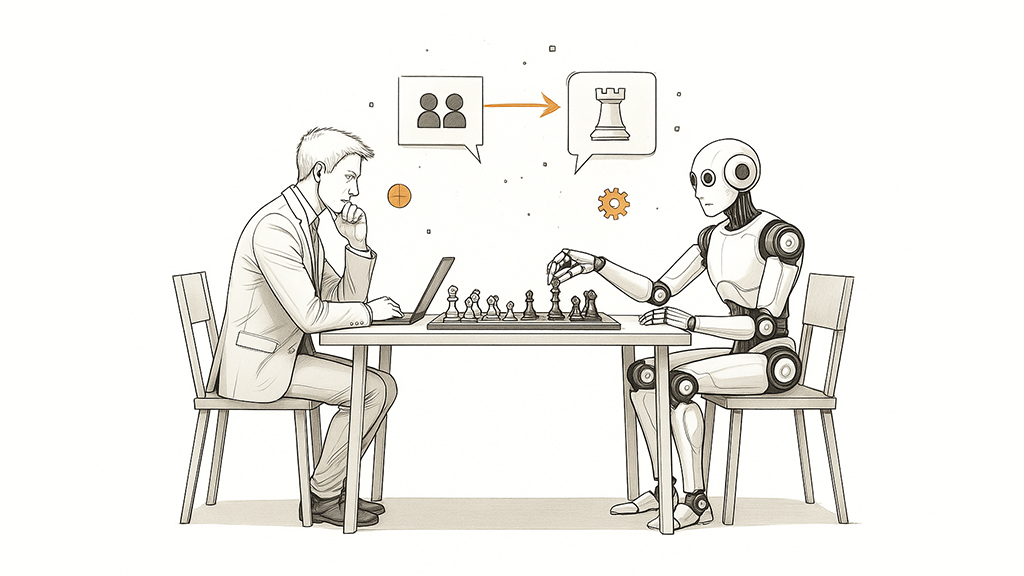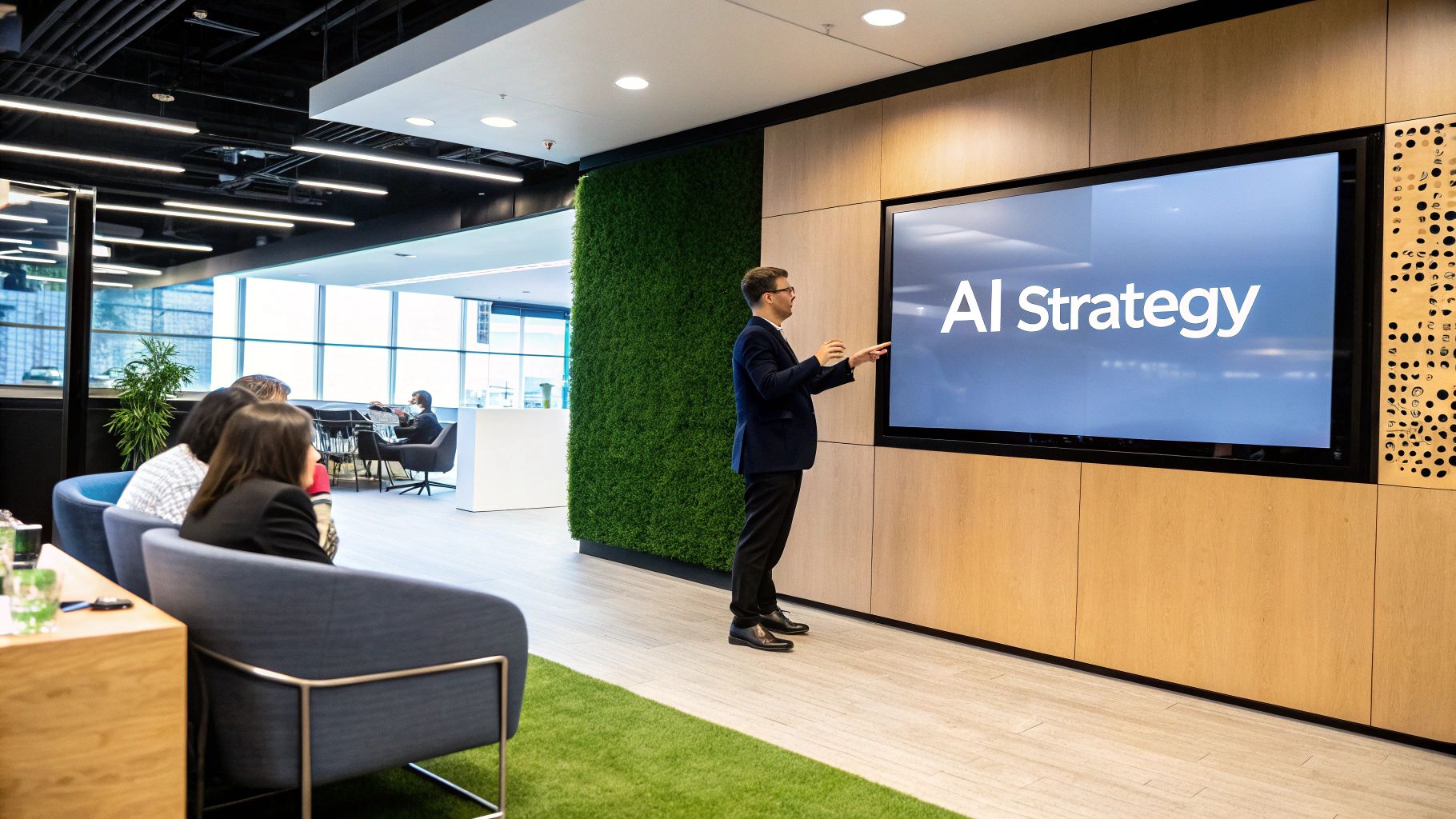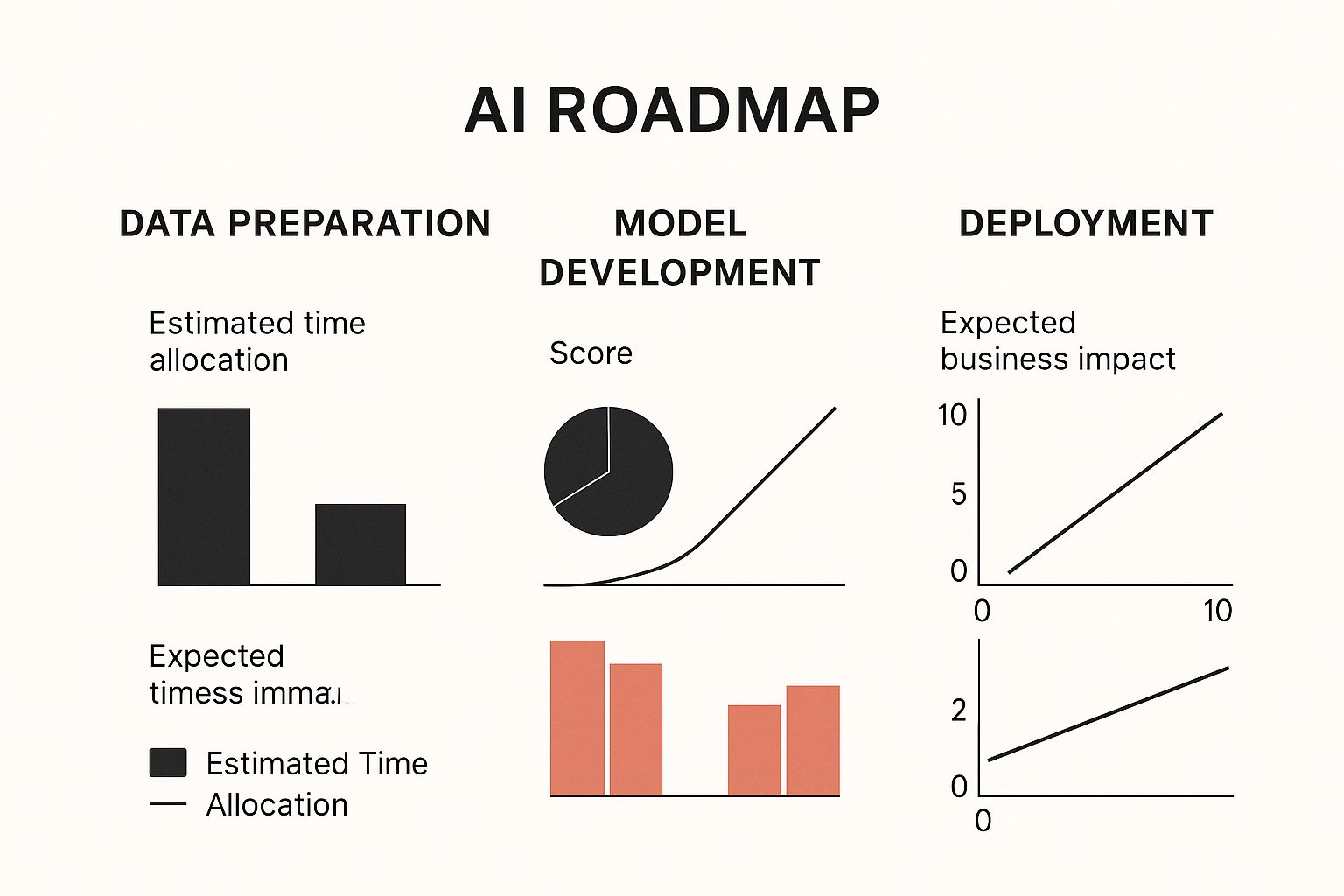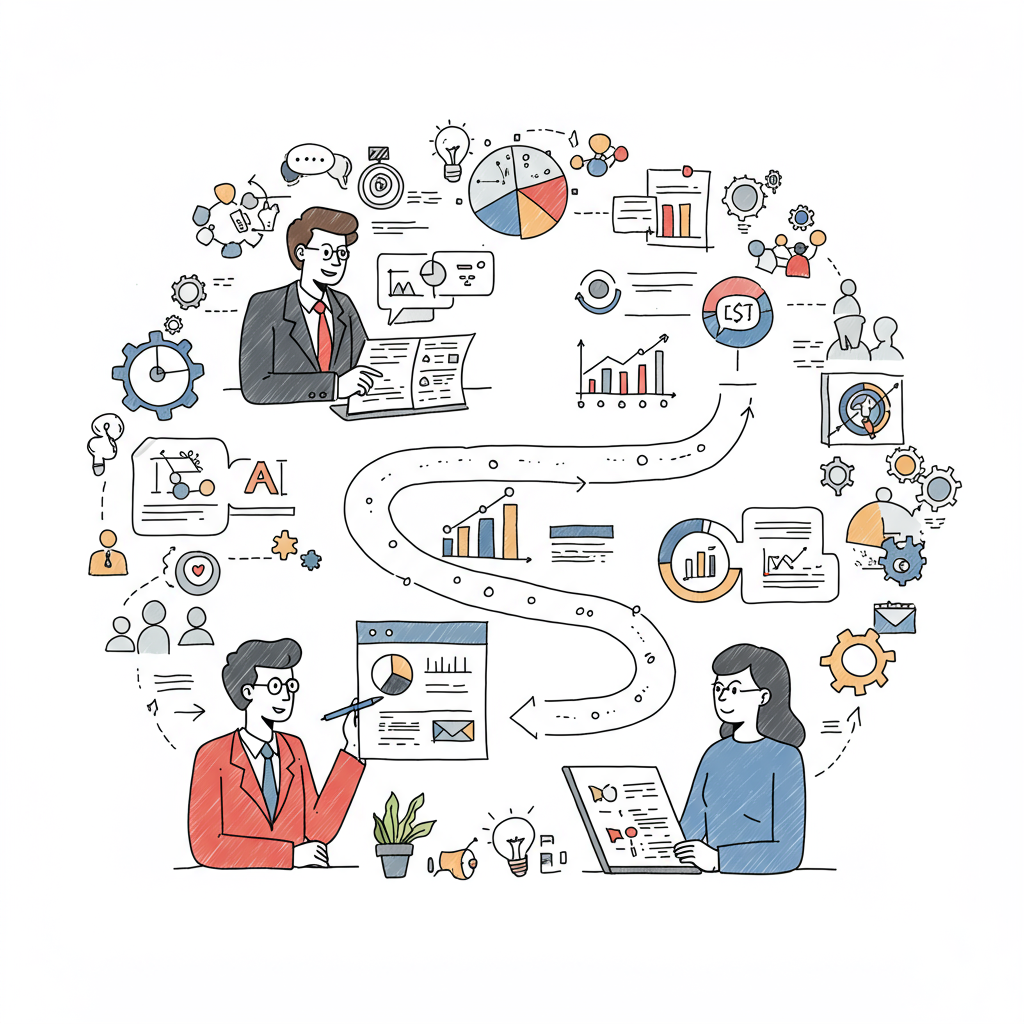Hiring an AI Strategy Consultant in the Netherlands
Find the right AI strategy consultant in the Netherlands. Learn how to build a powerful AI roadmap and drive real business growth with expert guidance.

Think of an AI strategy consultant as the master architect for your company's future with artificial intelligence. They're not just there to recommend flashy tech; they design the strategic blueprint that weaves AI into the very fabric of your business, making sure it’s built for sustainable growth and not just for show.
What an AI Strategy Consultant Actually Does
Many business leaders I talk to see AI with a mix of excitement and apprehension. They sense the potential but find it hard to connect that potential to a concrete, profitable plan. This is precisely where an expert in AI strategy consulting makes all the difference. They aren't just tech vendors pushing a product; they are strategic partners who bridge the gap between your business goals and what's technically possible with AI.
Here's an analogy I like to use: anyone can buy a set of power tools, but it takes an architect to design a building that's both functional and beautiful. An AI strategy consultant brings that architectural vision to your business. Their first step is always to get under the hood of your company. To understand your unique challenges, operational bottlenecks, and real opportunities for growth.
Their job is to pull you away from random AI experiments and guide you toward targeted projects that create genuine, measurable value. In today’s market, having a clear plan is what separates the industry leaders from everyone else.
The Growing Need in the Dutch Market
 The demand for this kind of expertise is picking up pace, especially here in the Netherlands. The Dutch AI market is on track to hit around US$2.38 billion by 2025, with generative AI expected to make up about US$1.34 billion of that. These aren't just numbers; they signal a market that has moved past the initial hype and is now focused on strategic, results-driven AI integration. You can dig deeper into these projections over on Statista.
The demand for this kind of expertise is picking up pace, especially here in the Netherlands. The Dutch AI market is on track to hit around US$2.38 billion by 2025, with generative AI expected to make up about US$1.34 billion of that. These aren't just numbers; they signal a market that has moved past the initial hype and is now focused on strategic, results-driven AI integration. You can dig deeper into these projections over on Statista.
This growth creates a powerful incentive for businesses to get proper guidance. Without a clear strategy, companies risk pouring money into mismatched tools, stumbling into compliance issues, or simply failing to see any return on their AI investment. A good consultant helps you sidestep those common pitfalls.
An AI strategy consultant’s main job is to ask the right questions. It’s not just, "What can AI do?" but rather, "What should AI do for our business to make us more profitable, efficient, and competitive?"
Core Functions and Business Value
To really grasp their impact, it helps to break down what an AI strategy consultant actually does day-to-day and the tangible value each function brings to the table. Their work covers the entire journey, from high-level planning right through to overseeing the practical rollout.
The table below breaks down the primary roles an AI Strategy Consultant plays, showing how they turn the often-overwhelming potential of AI into a clear, actionable roadmap for your business.
Core Functions of an AI Strategy Consultant
Function
Description
Business Value
Opportunity Assessment
Analyses business processes to find the highest-impact areas for AI, from marketing to operations and everything in between.
Pinpoints "quick wins" for an immediate return and identifies long-term strategic openings for a real competitive edge.
Strategy & Roadmap Development
Creates a detailed, phased plan that aligns AI projects with core business goals, complete with timelines and key performance indicators.
Provides a clear path forward, ensuring AI investments are deliberate, measurable, and directly support overall business growth.
Technology & Vendor Selection
Evaluates and recommends the most suitable AI tools, platforms, and partners based on your specific needs, budget, and existing tech stack.
Prevents costly mistakes from investing in the wrong technology and ensures you have the right solutions to get the job done.
Risk & Compliance Guidance
Helps you navigate the complex regulatory landscape, ensuring your AI systems are ethical, transparent, and compliant with laws like the EU AI Act.
Reduces legal and reputational risks, which is crucial for building and maintaining trust with your customers and stakeholders.
In short, a consultant's role is to ensure that every step you take with AI is a confident one, grounded in a strategy that makes sense for your specific organisation.
Why Dutch AI Consulting Is Becoming Hyper-Specialised

The world of AI consulting in the Netherlands is growing up. Gone are the days of the generalist "AI expert" who could apply a one-size-fits-all solution to any business problem. The market is maturing, and with that maturity comes a demand for something more: deep, sector-specific knowledge.
Think about it. A consultant who truly understands the complex dance of Dutch port logistics will see opportunities that a general tech expert would miss entirely. They know your specific data challenges, the operational pressures you face daily, and where AI can deliver the biggest wins. This shift toward specialisation isn’t just a trend; it's the sign of a healthy, evolving market.
This evolution is a direct response to businesses demanding real, tangible ROI. Companies are no longer dazzled by the technology itself. They want partners who can translate AI’s potential into measurable business outcomes, often through a collaborative process of AI co creation that builds on shared expertise.
From General Knowledge to Sector-Specific Mastery
The first wave of AI adoption was all about exploring broad possibilities. Now, the focus has sharpened to precise application. You can see this change reflected clearly in the Dutch consulting landscape, with a strong move toward solutions built for specific industries. Consulting firms are shaping their services for key Dutch sectors like logistics, agriculture, and healthcare, leaving the old generalist models behind.
This is happening for a simple reason: AI that understands deep business context delivers better, more relevant insights, and it does it faster. For a closer look at this industry-wide movement, you can discover more insights about AI consulting trends at CruxDigits.nl.
A specialist AI strategy consultant brings far more than just algorithms to the table—they bring context.
- Logistics & Supply Chain: They speak the language of terminal operating systems, last-mile delivery, and customs data. This allows them to help optimise routes or predict container arrivals with a level of accuracy a generalist couldn't match.
- Agriculture (Agri-tech): They're familiar with crop yield data, soil sensor outputs, and the precise impact of local weather patterns. Their work can lead directly to more sustainable farming and smarter resource management.
- Healthcare: They navigate the complexities of patient data privacy (AVG/GDPR), clinical trial data, and diagnostic imaging standards. This means they can help develop tools that genuinely assist clinicians without ever compromising patient safety.
This deep domain knowledge is what allows them to build more effective models. They know which data points truly matter and which are just noise.
A generalist might build you a weather prediction model. A specialist in Dutch agriculture will build you a model that predicts how a specific hailstorm will affect the tulip harvest in a particular region. The value is in the details.
The Business Case for Specialisation
Choosing a specialised AI strategy consultant isn't a luxury; it's a smart strategic move. The benefits are clear and connect directly to your bottom line.
1. Faster Time-to-Value: Specialists don't waste months getting up to speed on your industry. They hit the ground running, identifying high-impact problems and opportunities quickly. This shortens the time it takes to see a real return on your investment because they already know the common pitfalls and how to steer you around them.
2. Higher Quality Insights: When an AI model is built with a deep understanding of its industry context, the results are simply better. The predictions, classifications, and recommendations it generates are more trustworthy, making them far more useful for critical business decisions.
3. Reduced Implementation Risk: A consultant who knows your sector can anticipate how a new AI solution will interact with your existing systems and workflows. This foresight minimises disruption and ensures a much smoother rollout. They can offer guidance based on a wealth of real-world use cases from your own field.
This push for hyper-specialisation is a clear signal that the Dutch market has moved past the experimental phase. Businesses are now making calculated investments in AI, and they need partners who can ensure those investments are sound, strategic, and built for long-term success.
Strategic Frameworks That Drive Real Results
So, how does an experienced AI strategy consultant take a company's big ambitions and turn them into actual, measurable results? It’s certainly not by chasing the latest trends or making educated guesses. They use proven, structured frameworks – think of them as the architectural blueprints for your AI journey. These frameworks ensure every decision is sound, every pound is spent wisely, and every project pulls in the same direction as your core business goals.
Without a solid plan, it’s all too easy to get caught up in "shiny object syndrome," pouring resources into exciting tech that ultimately delivers very little value. A good framework cuts right through that noise. It forces a disciplined look at what’s possible, making sure your time and money go into the projects that will make the biggest difference.
This methodical approach is what separates professional AI strategy from amateur experimentation. It’s about building a solid foundation before you even think about laying the first brick.
From Assessment to Actionable Roadmaps
Any top-tier consultant worth their salt starts by getting a crystal-clear picture of where your organisation is right now. They often use something called an AI Maturity Model, which is essentially a diagnostic tool. It gauges your readiness across crucial areas like your data setup, your team's technical skills, and even your company culture. This gives everyone a realistic starting point, showing you where you’re strong and where you need to improve.
Once that baseline is clear, the focus shifts to spotting and prioritising the best opportunities. This is where a Use Case Prioritisation Matrix becomes incredibly useful.
It's a straightforward but powerful tool for scoring potential AI projects against the things that really matter to your business:
- Business Impact: Will this project genuinely boost revenue, cut costs, or make customers happier?
- Technical Feasibility: Do we realistically have the data, tech, and people to pull this off?
- Strategic Alignment: Does this idea actually support our bigger, long-term company vision?
- Implementation Effort: How much time and money will it take to get this up and running?
By scoring each idea, you create a data-driven pecking order. The conversation immediately shifts from a vague "what could we do?" to a focused "what should we do first?". A crucial step here is running a detailed AI requirements analysis to make sure the technical plan perfectly matches the business need.
A well-structured framework acts as your strategic filter. It ensures you're not just doing AI for the sake of it, but investing in solutions that solve real, high-value business problems.
The infographic below shows how these prioritised projects slot into a typical AI roadmap, giving a sense of the time commitment and expected impact at each stage.

As you can see, the early stages like data preparation take up a lot of time, but the business impact really starts to climb once the solutions are built and put to work.
Comparing AI Strategy Frameworks
Consultants have a whole toolkit of frameworks they can draw from, each with a slightly different focus. The key is knowing which one—or which combination—is right for the situation.
Here's a quick look at some of the common approaches you might encounter:
Framework
Primary Goal
Key Output
Best For
AI Canvas
Quickly map out a single AI project idea.
A one-page summary of the project's key components.
Start-ups or teams exploring a new AI concept.
AI Maturity Model
Assess an organisation's current AI readiness.
A readiness score and gap analysis report.
Companies just starting their AI journey.
Use Case Prioritisation
Rank potential AI projects by value and feasibility.
A prioritised roadmap of AI initiatives.
Businesses with many ideas but limited resources.
AI Governance Framework
Establish rules for responsible and ethical AI use.
Policies on data privacy, fairness, and compliance.
Organisations deploying AI in sensitive areas.
While each framework has its place, the real magic happens when a consultant blends them together to create a plan that fits your business like a glove.
Building Your Custom AI Strategy Framework
No two businesses are the same, so a one-size-fits-all AI strategy is a recipe for disappointment. The real value a consultant brings is their ability to adapt these proven methods and build a bespoke plan just for you. The result of this work is a comprehensive AI strategy framework that’s both ambitious and, crucially, achievable.
This custom plan becomes your North Star, clearly laying out:
- A sharp vision for how AI will give your company an edge.
- A prioritised list of AI projects, each with a solid business case.
- A phased roadmap with clear timelines and milestones.
- The key performance indicators (KPIs) you'll use to track success and ROI.
- A governance plan to handle risk, ethics, and compliance from day one.
In the end, these frameworks are about more than just fancy charts and matrices. They're about creating absolute clarity and building confidence. They take the fuzzy, abstract idea of "using AI" and turn it into a concrete, value-driven plan that lets your business move forward with real purpose.
Navigating Dutch and EU AI Regulations

Bringing artificial intelligence into your business isn't just a technical project; it's a regulatory one, especially here in the European Union. For any company in the Netherlands, stepping into AI means carefully navigating a complex legal world shaped by both EU-wide rules and national oversight. This is where an expert AI strategy consultant becomes invaluable. They do more than just talk tech—they act as your guide through this demanding legal landscape.
Their job is to translate dense legal jargon into practical, business-focused actions. This ensures you can innovate with confidence, knowing every step you take is built on a solid foundation of compliance and trust. Without this guidance, it's far too easy to stumble into costly legal mistakes that can stop a project in its tracks and badly damage your reputation.
This proactive approach to compliance isn't about holding you back. Far from it. It's about paving the way for sustainable growth by making sure your AI solutions are responsible, transparent, and legally sound from the very beginning.
Understanding the EU AI Act
The cornerstone of AI regulation across Europe is the EU AI Act. It's a landmark piece of legislation that’s setting a new global standard for how AI is governed. A consultant’s first task is to help you figure out exactly where your AI plans fit within its risk-based structure.
The Act essentially sorts AI applications into four different risk categories:
- Unacceptable Risk: These are AI systems seen as a clear threat to people, and they are banned outright. Think of government-run social scoring systems or AI designed to manipulate human behaviour in harmful ways.
- High-Risk: This is the most important category for most businesses. It covers AI used in critical areas like employment (CV-sorting tools), essential infrastructure, and medical devices. These systems face stringent requirements for risk management, data quality, transparency, and human oversight.
- Limited Risk: This includes systems like chatbots. Here, the main rule is transparency—users must be told upfront that they are interacting with an AI, not a person.
- Minimal Risk: The vast majority of AI systems fall into this category. Things like AI-powered spam filters or video games can be developed and used with no additional legal duties.
An experienced consultant will map your proposed AI projects against this framework. This helps you understand your specific obligations and build the necessary compliance checks right into your development process from day one.
The Role of Dutch National Oversight
While the EU AI Act sets the overarching rules, national bodies like the Dutch Data Protection Authority (Autoriteit Persoonsgegevens, or DPA) are responsible for enforcement. The regulatory mood in the Netherlands is evolving quickly, with a clear focus on promoting trustworthy, human-centric AI.
The DPA has become much more active in this space. The regulatory environment for AI in the Netherlands is shifting fast, which has a major impact on AI strategy consulting. The EU AI Act introduces a risk-based framework that bans certain AI and puts strict obligations on high-risk systems. At home, the Dutch DPA has expanded its role, issuing reports on the risks of specific algorithms.
A consultant's real job is to turn regulatory requirements into a competitive advantage. When you build trust and transparency into your AI, you don't just avoid fines—you build much stronger relationships with your customers.
This national focus means Dutch businesses have to be especially diligent. A consultant helps you align with both the broad EU mandates and the specific interpretations coming from the Dutch authorities. As we explored in our AI adoption guide, getting this balance right is crucial for a successful launch.
Ultimately, navigating this dual-layered regulatory scene is a core function of a modern AI strategy consultant. They give you the peace of mind that your journey into AI is not just innovative, but also responsible, secure, and fully compliant with the law. With their help, you can turn potential legal hurdles into a powerful demonstration of trustworthy and ethical AI.
Check out this AI strategy consulting tool to experience AI co-creation and what a clear AI strategy looks like from the free custom report it generates.
Finding and Hiring the Right Consultant for Your Business
Choosing the right AI consulting partner is one of the most important decisions you'll make. This isn't just about hiring a tech guru; it's about finding a strategic ally who gets your industry, fits with your company culture, and can turn ambitious ideas into a real, value-driven plan. The process takes some work, a clear-eyed view of your own needs, and asking the right questions.
When you make a confident, well-informed choice, you're setting the stage for a great partnership. The goal is a relationship built on trust and a shared vision, ensuring your investment pays off in real business results, not just a fancy report that gathers dust.
First, Look Inward: Define Your Project and What Success Looks Like
Before you even think about searching for an AI strategy consultant, you need to do some homework. A consultant can’t draw you a map if you don’t know where you want to go. Start by getting your leadership team in a room and figuring out precisely what you hope to accomplish.
- What's Your "Why"? Are you trying to make your operations more efficient? Maybe you're looking to create new revenue streams, delight your customers, or cut down on business risks. Nailing down your main goal is the essential first step.
- Set Real-World Targets: How will you know if this is working? Define clear key performance indicators (KPIs) from the start. Think in concrete terms, like "cut customer service response times by 30%" or "boost production line efficiency by 15%."
- Map Out the Scope: Get a high-level idea of the project's boundaries. Are you aiming for a strategy that spans the entire company, or are you focusing on just one department for now?
Having this internal alignment makes your search so much more effective. You'll be able to explain your needs clearly and judge every candidate against the same solid criteria.
The Make-or-Break Questions for Every Candidate
Once you start talking to potential consultants or firms, you need to dig deeper than just their technical chops. You’re vetting a strategic partner. To make this easier, you could use a smart AI Strategy consulting tool to help structure what you're looking for.
Here’s a checklist of questions that should guide every conversation:
- Industry Experience: "Can you share specific examples of how you've helped a company in our industry tackle a challenge like ours?" You're looking for genuine, sector-specific knowledge, not just general AI experience. They need to speak your language.
- Their Approach: "What frameworks and methodologies do you actually use to build an AI strategy?" Ask them to walk you through their process, from the first look to the final roadmap. This tells you a lot about how disciplined and structured they are.
- Proof of Results: "Could you share some case studies or references from past projects that show a clear return on investment?" Vague promises are a red flag. Insist on seeing hard evidence of real-world results and tangible business value.
- The Human Element: "Who from your team will be working with us, and how do you see them collaborating with our own people?" Understanding the team dynamic and how they plan to work with you is crucial for a smooth partnership.
Finding the right consultant is a two-way street. The best results happen when their expertise meets your team's deep knowledge of your own business.
Picking the Right Engagement Model
AI consulting isn't a one-size-fits-all service. The right setup depends entirely on your needs, your budget, and how much hands-on help you want.
- Project-Based: This is perfect when you have a specific, clearly defined goal, like creating your first AI roadmap or checking if a particular idea is even feasible. You pay a fixed price for a clear outcome.
- Retainer: For long-term strategic guidance, a retainer model is fantastic. It gives you ongoing access to an expert's brain as you put your strategy into action, allowing you to adapt and pivot as you go.
- Advisory: This is a more flexible, on-demand option. You bring in the consultant for high-level advice as needed, which is a great fit for businesses that already have a strong internal team but need an expert gut check now and then.
At the end of the day, your decision should come down to which partner really seems to understand your unique business and presents a clear, compelling vision for how AI can move it forward. The relationship should feel like a true partnership, supported by our expert team, who are dedicated to making your AI ambitions a reality.
Common Questions About AI Strategy Consulting
As you think about bringing an AI strategy consultant into the fold, it's completely normal for questions to pop up. Let's walk through some of the most common ones we hear from business leaders. The goal here is to cut through the noise, clear up any lingering doubts, and give you a solid footing for your AI journey.
How Much Does an AI Strategy Consultant Cost in the Netherlands?
This is usually the first question on everyone's mind, but the answer isn't a simple number. The cost can swing quite a bit depending on the consultant's track record, how complex your project is, and the size of their firm. You'll also see different ways of working—some charge a fixed fee for a specific project, others a daily rate, and some work on a monthly retainer for ongoing advice.
But here’s a better way to look at it: focusing only on the price tag can be a trap. It's far more valuable to think in terms of return on investment (ROI). A sharp, well-thought-out strategy from a seasoned ai strategy consultant can shield you from eye-wateringly expensive mistakes, stop you from pouring money into the wrong tech, and even uncover new revenue streams you hadn't imagined. Always ask for a detailed proposal that breaks down all the costs and, just as importantly, what you'll get for it.
The real cost isn’t the consultant’s fee; it’s the price of a failed AI project. A good strategy is your insurance against that failure and your best bet for success.
Can't My Internal IT Team Just Build Our AI Strategy?
Your internal IT team is absolutely crucial for putting any AI solution into practice, no question about it. But an external consultant brings something different and equally vital to the table: an objective, outside-in perspective. It's a viewpoint that’s tough to find when you're deep inside an organisation. They've seen what works and what spectacularly doesn't across dozens of industries, giving them a rich well of insights into market trends and technology options.
Their real skill lies in connecting the dots between what's technically possible and what's strategically profitable for your business. The best AI rollouts we've seen happen through AI co-creation, where an expert's strategic eye meets your internal team's deep, institutional knowledge. Think of it as a powerful partnership, not a replacement.
How Long Does It Take to Develop an AI Strategy?
Typically, getting from the first conversation to an initial AI strategy framework and roadmap takes somewhere between six and twelve weeks. Of course, this can shift based on your company's size, how many different departments need to be involved, and the state of your current data setup.
This timeframe isn't just about someone disappearing and coming back with a fancy report. It's an active, collaborative process involving several key stages:
- Stakeholder Interviews: Sitting down with leaders across the business to really understand their needs and goals.
- Data Readiness Assessment: A practical look at the quality and accessibility of your data—is it ready for AI?
- Use Case Prioritisation: Working together to identify and rank potential AI projects based on impact and feasibility, just as we discussed earlier.
- Roadmap Creation: Building a step-by-step plan with clear, achievable milestones.
A great consultant won't just drop a document on your desk and walk away. They deliver a living strategy, often pointing out "quick wins"—smaller projects that can show immediate value while you build towards the bigger, long-term vision.
What’s the First Step to Engage an AI Consultant?
The journey starts inside your own organisation. Before you even begin looking for a consultant, get your leadership team in a room and hash out what you truly hope to achieve with AI. Are you trying to make your operations more efficient? Develop brand-new products? Or create a customer experience that nobody else can match?
Once you have that clear, high-level goal, you can start looking for consultants with a background in your industry. It helps immensely to prepare a short document outlining your objectives, your current challenges, and what a successful outcome looks like to you. For many, a dedicated session like an AI strategy workshop is the perfect way to formalise these goals and get everyone on the same page.
With that clarity in hand, you’re ready to have a truly productive conversation. The first step isn’t finding a consultant; it’s knowing exactly why you need one.
Ready to turn your AI ambitions into a clear, actionable plan? Ekipa delivers a tailored AI strategy in just 24 hours, helping you uncover high-impact opportunities without the traditional consulting timeline or cost. Learn more about our approach and meet our expert team. Start building your AI roadmap today.



